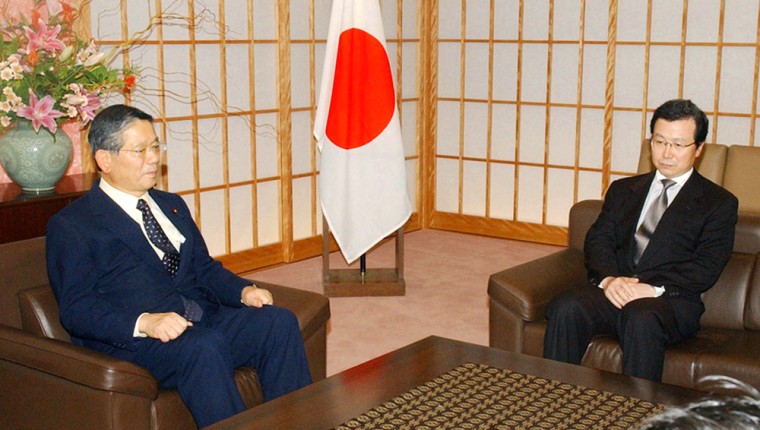Despite a thriving economic partnership, political ties between Japan and China are at their lowest ebb in years. The two countries are locked in disputes over World War II history, natural gas exploration and now a bold incursion by a Chinese nuclear submarine.
The troubles have blocked a meeting between the countries’ top leaders since 2001, complicated Northeast Asia’s scramble to meet its growing energy needs and threatened to limit the growth of Japan-China business ties.
Submarine intrusion
The startling intrusion by a Chinese nuclear submarine last week into Japanese waters introduced a disturbing military aspect to the tensions between East Asia’s two leading powers, putting greater urgency on calls for a repair in relations.
“We should hold talks because we have problems. We are making arrangements,” Prime Minister Junichiro Koizumi said Tuesday when asked whether he was trying to schedule a summit with Chinese President Hu Jintao at the upcoming Asia-Pacific Economic Cooperation meeting in Santiago, Chile.
The turmoil is a marked contrast to flourishing business relations. Bilateral trade hit a record $130 billion in 2003, a 30.3 percent increase from the previous year, and officials expect another record to be set this year.
Political ties, however, have long been rocky between Asia’s most populous nation and the nation with its biggest economy.
Territorial, historical disputes
Japan’s military conquest of China in the 1930s and ’40s and what the Chinese see as Tokyo’s reluctance to atone for its aggression have gnawed for decades at Chinese sensitivities. Japan, in turn, accuses Beijing of using history to browbeat Tokyo into providing aid and political concessions.
The countries have also squabbled over territory and natural resources. Both, for instance, claim a cluster of Japan-controlled East China Sea islands, called the Senkakus in Japanese and Diaoyu in Chinese. The two are also sparring over Chinese exploration of natural gas fields near Okinawa that Japan claims could infringe on its exclusive economic zone, and they have competing plans for an oil pipeline from Siberia to East Asia.
The flare-ups illustrate an increasingly competitive relationship.
China’s spectacular economic performance has turned it into a global growth engine, and Beijing is eagerly converting that power into diplomatic influence, especially among Southeast Asian countries that Japan had long considered its back yard.
Anxious in Tokyo
Tokyo nurses fears of being eclipsed, and has eyed with suspicion Beijing’s military spending and diplomatic maneuvering. The influential right-wing strongly favors responding with a more robust and assertive Japanese military.
“In the political arena, conservatives aren’t really trying to get along with China,” said Makoto Iokibe, a political scientist at Kobe University. “People who want to be tough with China feel as if we were about to go to war when something like this — the submarine, or gas development issues — happens.”
While the submarine incursion did not turn violent, it has come to symbolize the escalating friction between China and Japan in recent years.
The sub was spotted in Japanese territorial waters among islands between Okinawa and Taiwan on Nov. 10, putting Japan’s military on alert and prompting the navy to launch a maritime policing operation — only the second time such an order was issued in 50 years.
The submarine refused to identify itself, and Japan tracked it for days until announcing Friday that it was Chinese. Tokyo immediately protested to Beijing. Japanese officials said Tuesday that China had confirmed the sub’s identity, claimed the incursion was an accident and expressed regret, but Chinese officials refused to immediately confirm that.
Ugly incidents mar ties
The intrusion prompted calls for greater military vigilance in Tokyo, and joined a long list of incidents that have soured the atmosphere between China and Japan.
Koizumi has angered China repeatedly since 2001, when he began making annual visits to the Yasukuni Shrine, a war memorial that Beijing and other critics deride as a glorification of Tokyo’s military aggressions.
China has responded with a virtual block on summits between the two countries, calling for an end to the visits to the shrine as a prelude to warmer ties. China reportedly scuttled a hoped-for meeting between Koizumi and Chinese Prime Minister Wen Jiabao at an international gathering in Vietnam in October.
The anger overflowed dramatically in August, when rowdy Chinese fans booed, spat and burned Japanese flags when the Japanese soccer team visited for the Asian Cup tournament.
The frayed relations between East Asia’s two heavyweights has raised concerns throughout the region. Some say the economic links, robust as they are, would bloom much more fully without the tensions. Japan is competing with Europeans and others for business in China, and there is concern the friction puts the Japanese at a disadvantage.
“Economic cooperation is happening,” said Iokibe. “But if the political ties became better, China might be able to cooperate on major projects such as buying Japanese bullet trains.”
